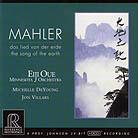September 2000
Oue/Minnestota’s rendition masterfully combines eternal and sensual nature with the fatalistic loneliness of man. Michelle De Young, in particular, draws out the text with subtlety and beauty. Jon Villars, most especially in "The Drunkard in Spring," is in superb and full voice. Perhaps the most satisfying aspect of this performance is the superb playing of the Minnesota Orchestra, which falls in synch with De Young, Villars, and the text, creating and sustaining the emotional and technical intensity required to pull off this massive work. Indeed, the only problem with this performance is that it must contend with the masterful Klemperer version with Christa Ludwig and Fritz Wunderlich, the standard for over 30 years and one of the all-time-great Mahler performances. On the whole, Oue and company acquit themselves nicely. I still find myself turning to Klemperer, but more from habit than an overwhelming superiority. And with time the Minnesota performance, with superb, indeed, reference sound, is replacing the Klemperer. Very highly recommended, and not just as second viewpoint. GO BACK TO: |
 Mahler - Das Lied von der
Erde
Mahler - Das Lied von der
Erde![[Reviewed on CD]](../format/regcd.gif) Throughout
his life, Gustav Mahler took solace in nature. In youth, he held an idealized vision of
man and nature as one, while at the end of his life, that vision cast nature as eternal
and man as but a passing moment. The text for "Das Lied von der Erde," or
"The Song of the Earth," is taken from a series of Chinese poems (translated to
German by Hans Bethge) that mediate upon life and nature. Often fatalistic, always
beautiful and extremely emotional, they posses the perfect temperament for the Mahlerian
canvas. The resulting six-movement symphonic work (his superstitions forestalled releasing
it as his ninth symphony, although his working notes referred to it by precisely that
title) contrasts massive forces with chamber-like settings, and utilizes both tenor and
alto voices. Completed in 1909, the work was first performed in late 1911, six months
after Mahler’s death.
Throughout
his life, Gustav Mahler took solace in nature. In youth, he held an idealized vision of
man and nature as one, while at the end of his life, that vision cast nature as eternal
and man as but a passing moment. The text for "Das Lied von der Erde," or
"The Song of the Earth," is taken from a series of Chinese poems (translated to
German by Hans Bethge) that mediate upon life and nature. Often fatalistic, always
beautiful and extremely emotional, they posses the perfect temperament for the Mahlerian
canvas. The resulting six-movement symphonic work (his superstitions forestalled releasing
it as his ninth symphony, although his working notes referred to it by precisely that
title) contrasts massive forces with chamber-like settings, and utilizes both tenor and
alto voices. Completed in 1909, the work was first performed in late 1911, six months
after Mahler’s death.